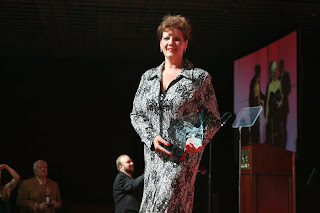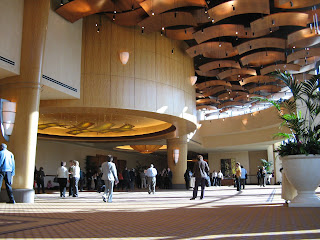
Canadians joined communities around the world on Saturday in turning off the lights for this year's Earth Hour, a global campaign to raise awareness of climate change.
Canadians in about 150 communities including Montreal, Toronto and Vancouver, pledged to turn off their lights for 60 minutes at 8 p.m. local time Saturday night.
In Toronto, much of the downtown core went dark as Mayor David Miller pulled a ceremonial switch in Nathan Phillips Square to dim the lights at City Hall shortly before the hour approached.
Canadian singer Nelly Furtado then led the thousands gathered in the square in an acoustic version of her hit song Turn Out the Lights.
The CN Tower soon darkened in the city's skyline, along with highrises, sports arenas such as the Rogers Centre and Air Canada Centre.
Meanwhile, in restaurants across the city, people dined by candlelight.
In Ottawa, the Peace Tower and its four-faced clock above Canada's Parliament faded to black.
About 100,000 Canadians out of a total of 300,000 people worldwide registered online for the event - putting the country among top participants anywhere.
In Alberta, fire and oil put darkness on ice
But the evening was not marked by total darkness in Canada's energy capital.
Officially, Calgary is marking Earth Hour, but patrons and bar owners were quick to point out the event coincided with a more historic Alberta tradition - a provincial battle on the ice between hometown Flames and the Edmonton Oilers.
Wayne Leong, owner of Calgary's Melrose Cafe and Bar, told CBC News he was expecting a packed house, so he wasn't shutting down anything.
"Not a chance, I'm sorry to say," Leong said with a laugh. "Let's celebrate Earth Hour at four in the morning. That will be a lot better time, I think."
Sydney Opera House dims lights
The campaign, organized by the World Wildlife Fund, was kicked off hours earlier Saturday in New Zealand and Fiji.
In Christchurch, New Zealand, more than 100 businesses and thousands of homes were plunged into darkness, computers and televisions were switched off and dinners delayed for the hour-long period.
Suva, Fiji, in the same time zone, also turned off its lights.
Those cities were soon followed by others in Australia and Asia, as Sydney's iconic Opera House and Bangkok's famous Wat Arun Buddhist temple went dark. As the clock ticked forward, Asian cities to the west followed suit.
Hours later, darkness enveloped Rome's Colosseum, Dublin's Custom House, London's City Hall and other landmarks across Europe. But other countries - including France, Germany, Spain and European Union institutions - planned nothing to mark Earth Hour.
One of the last major cities to participate will be San Francisco - home to the soon-to-be dimmed Golden Gate Bridge.
Group aims 100 million participants
During the one-hour event, Sydney was noticeably darker, though it was not a complete blackout. The business district was mostly dark; organizers said 250 of the 350 commercial buildings there had pledged to shut off their lights completely, and 94 of the top 100 companies on the Australian stock exchange were also participating.
The number of participants was not immediately available, but organizers were hoping that this year's worldwide effort would eclipse last year's single-city debut, when 2.2 million people and more than 2,000 businesses in Sydney shut off lights and appliances, resulting in a 10.2 per cent reduction in local carbon emissions during that hour.
"I'm putting my neck on the line, but my hope is that we top 100 million people," Earth Hour Australia chief executive Greg Bourne said.
The effect of last year's Earth Hour was infectious. This year, 26 major world cities and more than 300 other cities and towns have signed up to participate.
The Thai branch of the WWF said the campaign in Bangkok reduced the load on the electrical system by 73.34 megawatts and cut carbon dioxide emissions by 41.6 tons.
Organizers see the event as a way to encourage the world to conserve energy. While all lights in participating cities are unlikely to be cut, it is the symbolic darkening of monuments, businesses and individual homes they are most eagerly anticipating.
Even popular internet search engine Google put its support behind Earth Hour, with a black background to its main page and the words: "We've turned the lights out. Now it's your turn."
With files from the Associated Press and the Canadian Press











.jpg)








































